The iGaming business has experienced tremendous growth in the last few years. The reasons for that are numerous. And it seems the industry is poised to go even bigger.
iGaming has been on the rise for quite some time. Not just in the United States but globally as well. It seems that the more regulated the business becomes, the more people turn to it as a means to have a good time and earn money in the process.
Interestingly enough, the pandemic accelerated the meteoric rise in popularity of online casino games around the world. This couldn’t be truer for North America, which saw significant growth in both online player count and player base diversification.
In the last few years, more people have registered to play online casino games, placed bigger bets, and tried more casino products. When it comes to iGaming, numbers speak louder than words. And they are the key to understanding the huge popularity of the iGaming phenomenon.
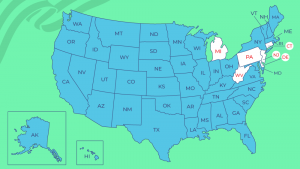
Overview
iGaming and the United States have not always enjoyed the favorable winds it is sailing on now. The business had its fair share of ups and downs, with heavy regulations, state restrictions, and property closures being chief among them.
And yet, the iGaming industry thrives. Some might wonder how that is possible, but a closer look will reveal the key factors behind the slow but methodical rise in popularity.
When we talk about gambling legislation on US soil, we mean two different types: federal and state. Federal law deals with legislation on a national level, whereas state law is restricted to different states. Currently, six US states have made it legal for iGaming businesses to operate.
These are:
-
Connecticut
-
Delaware
-
Michigan
-
New Jersey
-
Pennsylvania
-
West Virginia
Recently, Rhode Island has legalized online casinos – however, iGaming providers are still not active.
Other states like California, Illinois, Indiana, Nevada, Iowa, and New Hampshire have regulated internet gambling. In other states, players are allowed to play on gambling websites licensed by other countries. On the other hand, sports betting is much more accepted across the country.
The iGaming business in the United States is divided among three types of entities:
-
Tribal or state-owned casinos or racinos (casinos with a racetrack);
-
State lotteries;
-
Licensed third-party operators.
The global state of iGaming
iGaming is a major income driver across the world. Globally, the industry has achieved record levels of market valuation. In 2024, the global iGaming market is projected to reach a revenue of $107.30 billion – by 2028, the industry is expected to result in a market volume of $138.10 billion.
As more countries are shifting into easing their gambling legislations, so does America as it realizes the significant potential this industry has, establishing new and potentially viable revenue streams that could benefit local communities and the entire US economy.
Benefiting from the iGaming trend, online sports betting is anticipated to reach $49.96 billion in 2024. This iGaming vertical, in particular, has seen a stellar rise in the US in the last couple of years, mainly driven by online sportsbook providers.

A deeper look into US iGaming
The US iGaming industry is estimated to reach $5.12 billion in 2024 and is expected to achieve $10.98 billion by 2029. The growth of the local market is triggered by the pandemic and it starts from the third quarter of fiscal 2021.
The above numbers indicate that the United States wants to become a bigger player in the iGaming world. Further evidence could be seen in the fact that more states are moving to ease the gambling legislation, thus allowing iGaming businesses to operate in the open.
This change of heart is partially driven by the latest fintech and cyber security innovations. Other factors contributing to the rise of iGaming in America are the younger audience getting into online gambling and the increased popularity of mobile gaming.
It is clear to anyone who keeps an eye on the gambling industry in the United States that the online casino business is having a moment. And it seems that its popularity will not stop anytime soon, as evidenced by the state-wide revenue numbers.
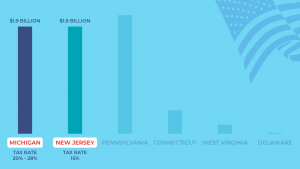
Michigan
Michigan has been leading the US iGaming business with a total revenue of $1.9 billion for 2023. The market in this state is one of the most competitive online casino markets in the United States. Therefore, online gambling in Michigan is allowed from 2019, while the first app was launched in January 2021.
The state has a total of 15 online casinos, of which BetMGM is the most popular one. Furthermore, the number of online casinos is limited due to the expensive financial framework.
The iGaming industry in Michigan requires a $ 50,000 application fee and an initial five-year license fee of $100,000 for entry. Afterward, the operators must pay an annual renewal fee of $50,000 to maintain their license.
The minimum revenue tax is 20%, which can go up to 28% depending on the revenue. This revenue is distributed to public services, schools, and compulsive gambling treatment services.
New Jersey
The state of New Jersey has the most competitive iGaming industry, with 30 licensed online casinos. The industry has generated an estimated revenue of $1.9 billion in the last year. Online gambling was legalized in February 2013, and the first platform was launched in November of the same year.
Regarding the legal framework, all online casino operators are required to pay an application fee of $100,000, which might be deducted from the $400,000 licensing fee if the application is deemed suitable. The annual renewal fee is at least $250,000, and the tax rate is 15%.
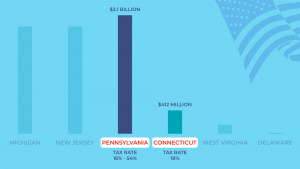
Pennsylvania
Currently, Pennsylvania is the most lucrative market for iGaming, with a revenue of $2.1 billion for 2023. The online casino industry includes 21 operators, with the first one being launched in 2019. The most renowned iGaming operators are BetMGM, Ceasar Palace Casino, and DraftKings Casino.
The online providers must pay a license fee varying from $4 million to $10 million, with a renewal fee of $250,000 after 5 years. If a company with a license for a land-based casino wants to establish an online platform, it should apply for an interactive gaming license and pay a one-time fee of $1 million.
The tax rate depends on the game type, and it can be between 16% for online peer-to-peer games (i.e., poker) and 54% for slot machine games.
Connecticut
The iGaming in Connecticut was legalized in 2021, with 2 online casinos – DraftKings and Mohegan Sun available for local players.
Furthermore, these are also the two land-based casinos operating in the state – therefore, both tribes exercise duopoly over the casino industry in Connecticut. In 2023, the total revenue generated from the online casino providers was $412 million, with a tax rate of 18%.
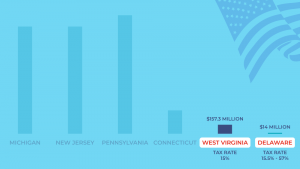
West Virginia
The first iGaming platform in West Virginia was launched in 2020, after the legislation of online casinos in 2019. There are 7 licensed operators, which generated $157.3 million in revenue in 2023.
The application fee for casino operators is $250,000, and the license may be renewed for a fee of $100,000 every five years as long as the iGaming platforms respond to the requirements. The tax rate is 15% of the gross revenue.
Delaware
Delaware’s iGaming revenue for 2023 is equal to $14 million. The state was the first to legalize the online casino industry in 2012. Interestingly, a single-operator system functions in three individual gambling sites – Delaware Park, Dover Downs, and Harrington.
The providers must pay a $4,000 application fee, which may be renewed annually for a fee of $4,000. Furthermore, table games are subject to a 15.5 % tax, while internet video lotteries are subject to a 57% effective tax rate.
What comes next?
Given the popularity and profitability of the iGaming business across the States and beyond, more and more US states that previously banned online and offline casino operations are looking into ways to reverse that. Let’s take a quick look at what we can expect.
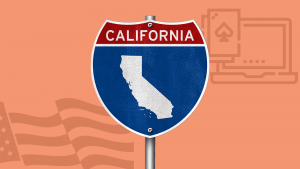
California
The Golden Stat is a big gambling market valued at $30 billion. The state has a history of trying to legalize online casino games, with the latest attempt being Proposition 27 (California Solutions to Homelessness and Mental Health Support Act), aimed at allowing mobile betting, was strongly opposed by the local tribal gambling community.
The tribal casino operators see online casinos as a threat to their land-based businesses, and online sports betting is viewed as its gateway. Will tribal casinos and online gambling providers find a middle ground remains to be seen? For now, a compromise is nowhere to be seen, which will deter any future attempts at bringing iGaming to California.
Florida
Florida has a questionable history with online gambling. Banned for a long time, it was briefly made legal in 2021, with exclusive retail and mobile sports betting rights given to the Seminoles Tribe (Seminoles Florida Sports Betting Compact).
However, the decision has been overturned because, according to third parties, the tribal casinos were allowed to conduct sports betting only on tribal grounds, and online betting, albeit on servers within the tribal territory, violated the above rule, as it happened not on physical location.
Although real-money online casinos are not permitted, there are social online casinos where players might enjoy the thrill of slots, roulette, blackjack, and other games. These online casinos do not require a deposit of real money, as they are for entertainment purposes.

Georgia
Online casino games remain outlawed in the state of Georgia. A group lobbying on behalf of BetMGM, DraftKings, FanDuel, and Fanatics is pushing to legalize online gambling. Although it’s too early to tell, some remain hopeful that a brighter gambling future awaits.
Kentucky
Online sports betting was officially legalized in September 2023. The anticipated revenue is estimated at $23 million. In addition, the online providers must pay a $50,000 initial fee and a $10,000 renewal fee, while the tax rate is set at 14.25%.
Minnesota
Minnesota remains optimistic that it will pass an online gambling bill this year, which would also gain the approval of the Senate. Casino operators are divided in their opinion regarding the bill, and local legislators see that as the biggest obstacle to legalizing iGaming in the state.
This could be potentially reversed through tribal casinos, which might be willing to support such efforts if paired with in-person betting on tribal grounds.
Missouri
The state of Missouri has shown genuine interest in legalizing online gambling, as evidenced by the four bills proposed by local legislators earlier this year. The SB 30 bill, sponsored by Senator Tony Luetkemeyer, aims to promote sports betting.
Senator Denny Hoskins’ sponsored SB 1 bill targets mobile sports gambling and looks to regulate video game terminals. The HB 556 bill proposed by Representative Dan Houx is also aimed at online sports betting.
The fourth bill, HB 581, drafted by Representative Phil Christofanelli, will allow online sports betting inside and outside land-based casinos. The development of Missouri’s iGaming market looks quite optimistic at this point.
North Carolina
North Carolina was close to approving a bill that would have allowed online gambling in the state. It did not pass, and local lobbyists and legislators are mounting a new campaign to try and legalize iGaming.
South Carolina
The Palmetto State has mounted some serious efforts in the past to legalize both casino and sports betting. Those did not come to fruition. South Carolina hopes that if neighboring states allow online gambling, this will aid their efforts to pass an iGaming bill in the Senate.

Texas
Texans are very particular about gambling, seemingly unwilling to authorize iGaming on their grounds, with online sports betting being the exception.
Texas has some of the hardest gambling laws in the United States, with large groups of Conservatives and religious groups backing them up. As such, gambling lobbyists (a mix of Democrats and local sports franchise owners) are likely to face a tough battle ahead of the next Senate hearing.
After a brief overview of the current iGaming market in the US, let’s see what the future holds for the industry.
Future trends
The iGaming industry is expected to grow in popularity and revenue. Several factors could influence that growth. Here are some of them which we believe will be important for the future development of the entire business sector.

Blockchain and crypto
Despite stricter regulations, some experts believe the entire online gaming industry (iGaming included) will slowly move towards a more decentralized environment. Blockchain technology offers a new type of gambling experience that guarantees safer payment transactions.
Blockchain seems the way to go regarding online casinos due to several key factors. First, it eliminates third parties when processing payments or other transactions. Blockchain allows transactions through smart contracts, ensuring higher security for players.
Crypto gambling offers many advantages to casino players. Players enjoy greater privacy and transparency since no personal information is submitted, and all types of transactions are visible on the public ledger.
Crypto processing is fast, reliable, irreversible, and with low transaction fees. Crypto is protected from inflation and is not always taxed, making it a great payment choice for gamblers.

Influencers
By attracting influencers, iGaming operators could further enhance brand reputation, reach more extensive and diversified audiences, and increase website visits and registrations, thus potentially increasing a company’s net worth and market share.
Personalization
It’s not enough to lure new players to your online casino website and convince them to sign in. It’s how gamblers feel during each stage of the player journey that will tip the scale and ultimately make them stick longer on your website and gamble with real money.
Online casino providers should make players feel welcomed and appreciated through a combination of welcome bonuses and reactivation tactics. A user-centric approach could ensure brand loyalty and increase the percentage of registrations.
Free-to-play games
New players are often hesitant to bet real money. That’s why iGaming sites need a tool to convert one-time players into regular and loyal clients. Free-to-play games are one such method that could potentially yield excellent results.
It allows players to test drive a particular type of game before switching to real-time betting games. This builds rapport with players, which could lead to more conversions.

Responsible gaming
Responsible gaming is shaping up to be one of the hottest trends. We will see more casino operators working towards preventing affective behavior and dealing with problematic players to offer a healthier, stress-free gaming experience.
Conclusion
The iGaming business in the United States has come a long way since the very first online casino websites launched. The iGaming industry is now more diverse, immersive, and inclusive, offering bigger prize pools and being an affordable way to get into casino games.
US iGaming has been on the rise since the early 2000s, aided by the prevalence of mobile gaming, high-speed internet, and, more recently, by the global lockdown caused by the coronavirus, which forced many to stay home, leading to an increase in online casino games.
Nowadays, the iGaming industry has radically changed, having embraced technological innovation to reach a larger global audience. iGaming providers like EGT Digital are making their way through Europe with a large portfolio of cutting-edge entertainment products and services to empower a constantly changing casino industry.
Soon, these modern companies will enter the US market to present the high quality, reliability, and rich functionality that consumers value.
FAQ
How big is the US online gambling industry?
The US iGaming industry is projected to grow from $5.12 billion in 2024 to $10.98 billion by 2029, a surge initiated in Q3 2021 due to the pandemic. This growth is driven by relaxed state gambling laws, fintech and cybersecurity innovations, and a younger audience’s interest in online gambling and mobile gaming. The rising state-wide revenue figures underscore the booming popularity of online casinos in the US.
What is iGaming business?
The iGaming industry, encompassing online gambling and sports betting, is a major global income driver. In 2024, the global market is expected to generate $107.30 billion, growing to $138.10 billion by 2028. As countries, including the US, ease gambling regulations, new revenue streams emerge, benefiting local communities and the national economy. Online sports betting alone is projected to reach $49.96 billion in 2024, driven by the rise of online sportsbook providers.
Which US states allow iGaming?
In the US, gambling legislation exists at both federal and state levels, with federal law handling national regulations and state laws differing by state. Currently, iGaming is legal in Connecticut, Delaware, Michigan, New Jersey, Pennsylvania, and West Virginia. Recently, Rhode Island has also legalized online casinos, bringing the total to seven states where online gambling is legal.




 Обратно към Игри
Обратно към Игри Цял екран
Цял екран